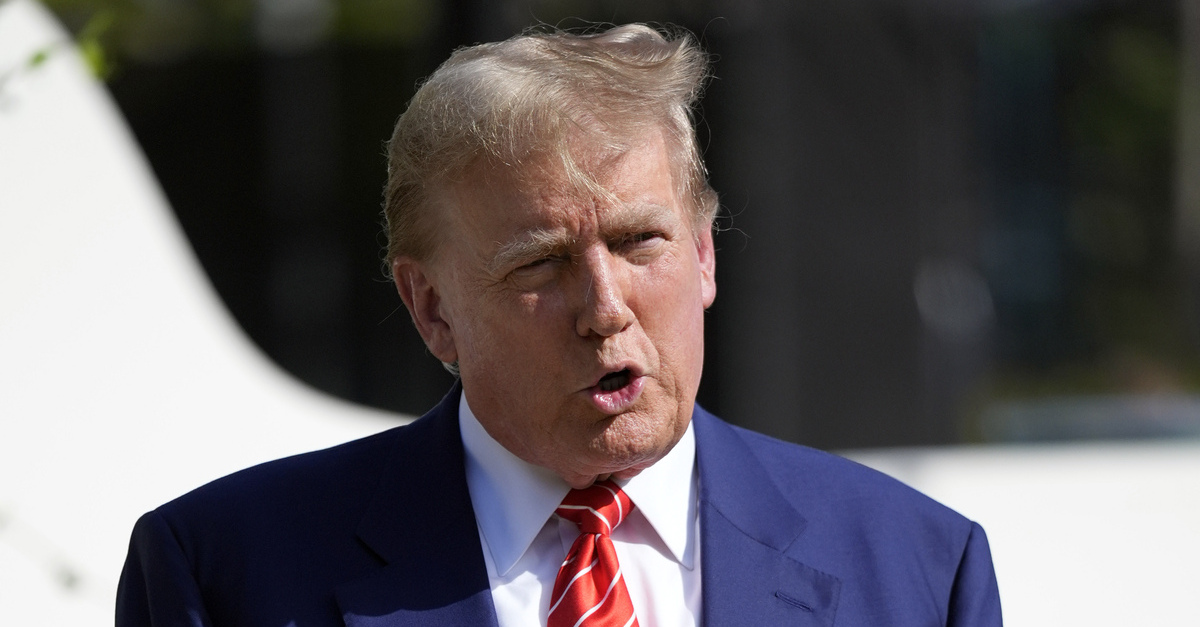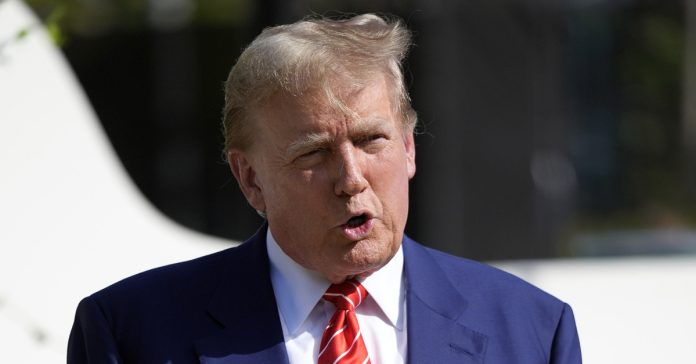
Republican presidential candidate former President Donald Trump speaks after voting in the Florida primary election in Palm Beach, Fla., Tuesday, March 19, 2024. (AP Photo/Wilfredo Lee)
Former president Donald Trump on Tuesday afternoon pressed his case before the U.S. Supreme Court for immunity from criminal prosecution over the riots at the U.S. Capitol on Jan. 6, 2021.
“From 1789 to 2023, no former, or current, President faced criminal charges for his official acts— for good reason,” the former president’s 67-page brief begins. “The President cannot function, and the Presidency itself cannot retain its vital independence, if the President faces criminal prosecution for official acts once he leaves office.”
In late February, the 45th president convinced at least five justices to take up his case – appealing an order from the U.S. Court of Appeals for the District of Columbia finding Trump does not have presidential immunity from prosecution on charges alleging he criminally conspired to overturn the results of the 2020 presidential election.
Key to the arguments advanced on Tuesday are both forward-looking concerns and long-past considerations of constitutional law.
The 45th president’s brief boils down to a policy argument that allowing criminal prosecution for anything that occurred while he was in office would irreparably harm and hamstring the presidency itself.
“A denial of criminal immunity would incapacitate every future President with de facto blackmail and extortion while in office, and condemn him to years of post-office trauma at the hands of political opponents,” the brief reads. “The threat of future prosecution and imprisonment would become a political cudgel to influence the most sensitive and controversial Presidential decisions, taking away the strength, authority, and decisiveness of the Presidency.”
In terms of legal arguments, Trump’s attorneys claim the concept of “absolute” criminal immunity for the U.S. president can be sourced to the Executive Vesting Clause and the separation of powers.
Under such an understanding of the U.S. Constitution, “courts lack authority to sit in judgment directly over the President’s official acts,” the filing argues – citing both precedent and a concurrence by former Supreme Court Justice Antonin Scalia. Their argument goes on to encapsulate the idea that “no court has authority to direct the President to take an official act” and “that the President enjoys absolute immunity from civil liability for his official acts.”
Trump’s attorneys say an “unbroken line of authority reaffirms” their argument and makes the application of presidential immunity all the more stronger when applied to criminal charges.
“Article III courts cannot sit in criminal judgment over a President’s official acts,” the brief argues. “Because the courts cannot examine the President’s official acts, they cannot entertain charges, impose judgment, and imprison him on the basis of those official acts. They cannot conduct a jury trial based on his official acts.”
This wide power, Trump argues, even extends to a former president.
A secondary legal argument advanced by Trump is that the Impeachment Judgment Clause confirms “that current and former Presidents are immune from criminal prosecution for official acts.”
In this version of constitutional law, Trump argues, the clause “dictates” that a U.S. president, or former president, “cannot be prosecuted unless he is first impeached and convicted by the Senate.”
“Thus, the Constitution provides for impeachment and conviction by the political branches—vitally requiring a two-thirds majority of the Senate, and therefore requiring a nationwide political consensus—as the principal structural check against Presidential misfeasance,” the brief goes on. “The Clause’s plain language presupposes that an unimpeached and un-convicted President is immune from prosecution. By specifying the consequences of only one of two possible outcomes of impeachment— i.e., “the Party convicted” — the Clause entails that those consequences do not apply to the other outcome.”
Trump also argues that “our political history” counsels against formally charging a president – despite the prevalence of rhetorically charging a president with engaging in “criminal” behavior.
The brief offers a brief but sweeping history lesson of examples:
For example, John Quincy Adams was accused of a “corrupt bargain” in appointing Henry Clay as Secretary of State after Clay delivered the 1824 election to him in the House. Andrew Jackson disregarded this Court’s rulings and forced the resettlement of many people, resulting in the infamous “Trail of Tears.” President Roosevelt imprisoned over 100,000 Japanese Americans during World War II. President Clinton repeatedly launched military strikes in the Middle East on the eve of critical developments in the Monica Lewinsky scandal, with the likely goal of deflecting media attention from his political travails. President Clinton also pardoned fugitive financier Marc Rich, resulting in widespread accusations of criminal corruption, including illegal quid pro quo. President George W. Bush was accused of knowingly providing false information to Congress about Saddam Hussein’s “weapons of mass destruction” in order to launch the Iraq War on false pretenses, leading to the deaths of over 4,400 Americans, with almost 32,000 wounded. President Obama targeted and killed U.S. citizens abroad by drone strike without due process.
The brief goes on to reference Obama’s drone strikes a second time – in a section alleging special counsel Jack Smith has opened the door to at least some defense based on criminal immunity.
“[T]he Special Counsel admitted in the D.C. Circuit that criminal immunity likely applies to at least some official acts of the President,” the brief argues before explaining in a parenthetical: “Special Counsel admitting that President Obama’s ‘drone strike’ where U.S. ‘civilians were killed … might be the kind of place in which the Court would properly recognize some kind of immunity.’”
The Tuesday brief is the latest volley in a long-running debate on the reach of presidential immunity – both in Trump’s case on a basic level; and in terms of being confronted by the nation’s high court itself.
In Trump’s early February application for a stay pending the filing of a petition for writ of certiorari, the former president referenced an earlier failed effort by Smith to force the nine justices’ hands and issue a preemptive decision on “absolute immunity” claims before the D.C. appellate court could even review and rule on the issue.
While the prosecutorial bite at the apple failed to even put teeth marks into the skin, Trump scored a series of dilatory victories with his last-minute appeal, and the court later decided to hold off on hearing oral arguments on the immunity issue until the very last day of the current session. The upshot is two-fold: the Supreme Court’s opinion likely won’t be coming until late June; any potential criminal trial likely would not begin until the end of summer or early fall.
“The Court should reverse the D.C. Circuit and order the dismissal of the indictment,” Trump’s brief concludes. “If the Court finds further fact-finding necessary, it should remand to the district court to apply the doctrine in the first instance.”
Have a tip we should know? [email protected]

